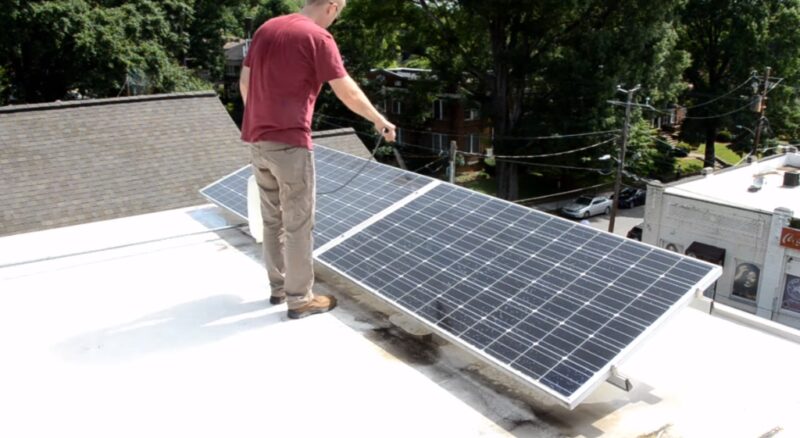Solar installations, often hailed as the vanguards of green energy, have been lighting up homes and businesses across the globe, offering a more sustainable alternative to fossil fuels. Yet, as with any piece of machinery or technology, there’s a requisite amount of care and attention needed to keep them at their prime.
Solar panels are the most widespread installations of this sort, by far.
One crucial aspect of this care is ensuring the cleanliness of these installations, a factor that plays a significant role in their efficiency and overall lifespan. Let us talk about this a bit.
Factors Affecting Cleaning Frequency
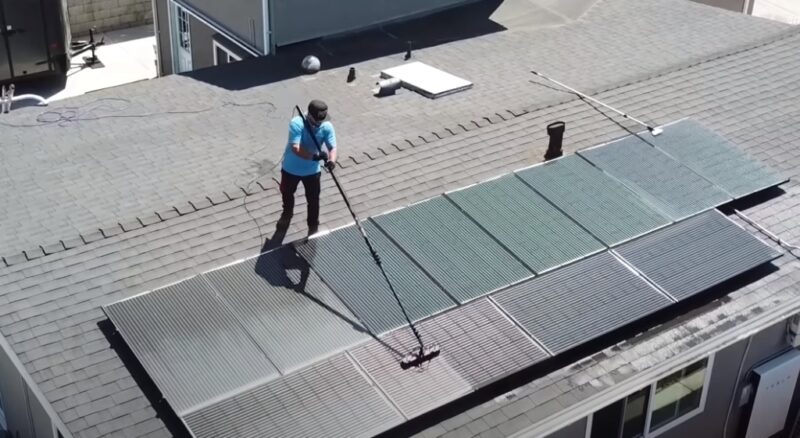
It’s not a one-size-fits-all answer when it comes to cleaning frequency. On average, these should be cleaned at least twice a year. Still, several factors play a part in determining how often you should tend to your installation.
Environmental Conditions
Locations with higher amounts of dust, pollen, or industrial fallout can demand more frequent cleaning.
- if you live near a construction site or a busy road, panels might be quite affected.
- Your panels may accumulate dirt at a faster rate than those in more remote areas.
- In coastal areas, the salty sea breeze can leave a residue on your installation.
- This can reduce its efficiency if left unattended.
- Hence, coastal residents might need to clean their systems more often than those living inland.
- Rainfall can naturally clean your panels.
- If you live in an area with regular rain, the need for manual cleaning can be reduced.
- But this isn’t a substitute for occasional thorough cleaning.
- In areas prone to long dry spells, dust, and bird droppings can accumulate more quickly.
- In such cases, you might find yourself cleaning your installation more often to maintain peak efficiency.
Signs Your Panels Need Cleaning
You don’t always need to stick to a strict schedule. Sometimes, it’s about being observant and spotting the signs that indicate it’s time for a cleanup.
Visual Inspection
The most obvious sign is visible dirt or debris. If you notice a layer of dust or any bird droppings, it’s time to give them a clean.
- Another visual cue can be uneven coloring.
- If some parts of your installation appear darker or discolored, it might be due to accumulated grime or residue.
Energy Output Checks
Monitor the energy output of your system regularly. If there’s a sudden drop in efficiency or energy production, it could be due to dirty panels.
- Regularly comparing the energy output against standard benchmarks can be a proactive way to determine when cleaning is required.
- Remember, even a minor decline can lead to significant losses over time.
Best Practices for Cleaning
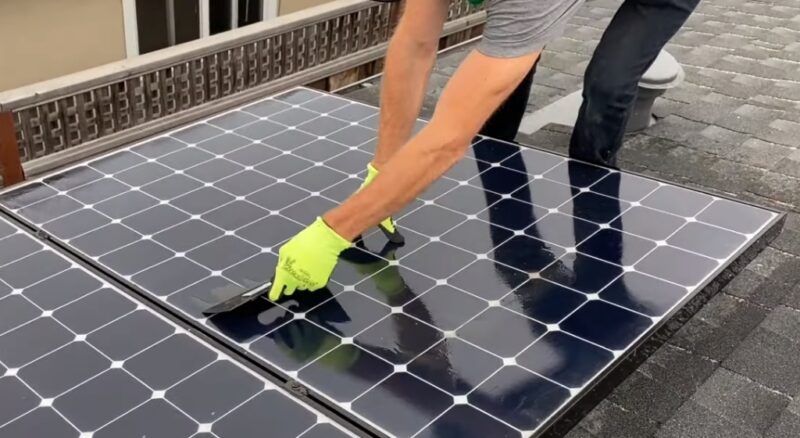
Maintaining your solar installation is not just about frequency but also about the right methods. Here are some best practices to ensure a safe and effective cleanup.
Safety First
Before you begin, ensure that all electrical connections are turned off. Working with electricity, especially outdoors, can be dangerous.
If your panels are installed on the roof, use appropriate safety gear. It’s always advisable to work with a partner or inform someone before you start cleaning.
Gentle Cleaning Methods
Use a soft brush or a squeegee with a long handle. This helps in removing loose dirt without scratching the panels. For stubborn spots, lukewarm water mixed with mild detergent can be used. Avoid abrasive materials or high-pressure water as they can damage the panels.
Cost Implications of Neglect
Delaying or ignoring the need for cleaning can have monetary consequences. It’s essential to understand the financial implications of neglecting regular maintenance.
Decreased Efficiency and Financial Loss
Dirty panels can lead to reduced energy output by up to 31%, which is a significant drop. While this might seem minimal in the short term, the cumulative loss over months can lead to significant financial implications. Lesser efficiency means higher utility bills if you rely on additional power sources.
A decline in performance can also mean not getting the most out of your initial investment in the solar system. The faster the degradation in efficiency, the longer it will take to achieve a return on your investment.
Potential Repair Costs
Neglect can lead to more than just reduced efficiency. Dirt, debris, and other particles can sometimes cause minor scratches or damages if left unattended for prolonged periods. The costs associated with repairing or replacing parts of your system can be considerably higher than those for regular cleaning.
Some warranties and service contracts specify regular maintenance as a requirement. Not adhering to these conditions could lead to voiding your warranty or incurring additional service charges.
The Environmental Perspective
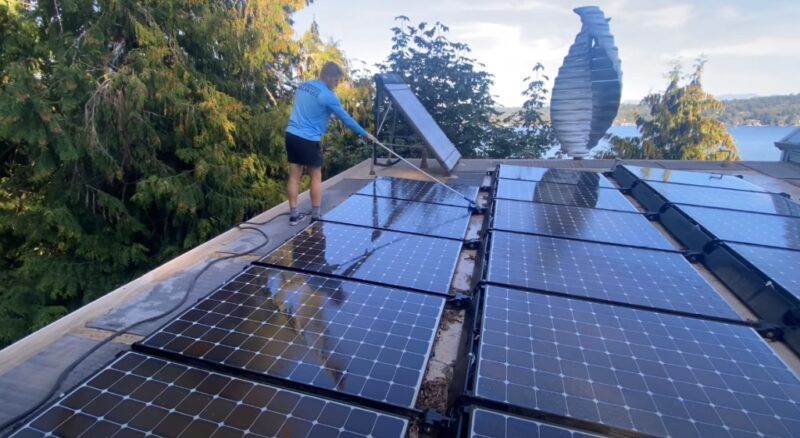
Beyond the tangible benefits of regular cleaning, there’s also an environmental angle to consider. A well-maintained solar installation contributes more significantly to a sustainable future. With every bit of efficiency regained from cleaning, you draw less from non-renewable sources.
This means reduced carbon footprints and more efficient use of the sun’s abundant energy. As more households and businesses opt for renewable energy sources, ensuring each unit operates at its peak is vital. Collectively, this can lead to a considerable decrease in non-renewable energy consumption.
Efficiently working panels have a longer lifespan. By ensuring regular maintenance, you delay the need for replacements and reduce electronic waste. Proper maintenance also ensures that minor issues are addressed promptly.
This can prevent more significant problems, leading to reduced waste of resources and materials in the long run.
FAQs
Is there an ideal time of the day to clean solar panels?
It’s best to clean solar panels early in the morning or late in the afternoon when the sun isn’t at its peak to avoid any potential damage from sudden temperature changes.
Can cleaning frequency affect the lifespan of my solar panels?
Yes, regularly cleaned panels are less likely to have accumulated debris, which can cause minor scratches or damages over time, potentially affecting their lifespan.
How can I determine the ideal cleaning frequency for my specific location?
Monitor your energy output and visually inspect your panels regularly. If you’re in an area with more dust, industrial fallout, or bird activity, you may need more frequent cleanings.
Do solar panels require a special cleaning solution?
Generally, no. Lukewarm water and a mild detergent should suffice for most cleanings. To prevent unpleasant scenarios, always refer to the manufacturer’s guidelines.
How do environmental factors like snow or sandstorms affect cleaning frequency?
Snow can cover panels, affecting their performance, but it usually melts and slides off. Sandstorms can deposit fine layers of sand, which may require more immediate cleaning to restore optimal efficiency.
Wrapping Up
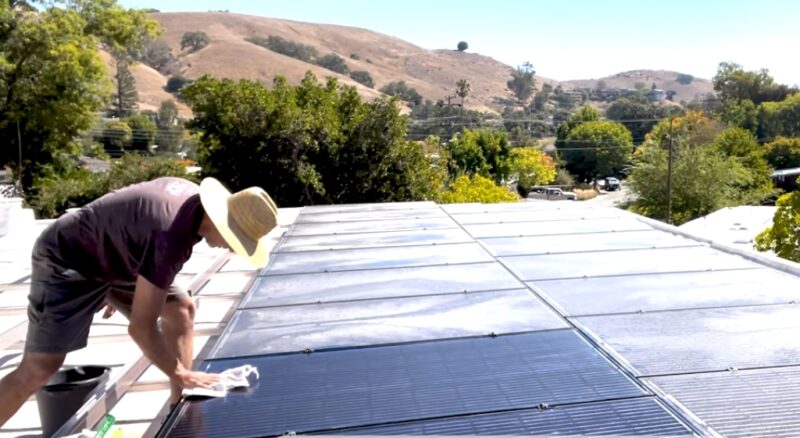
As we continue our collective journey towards creating a more sustainable planet, the significance of optimal solar installation performance cannot be overstated. Regular maintenance and cleaning are not mere suggestions but essential practices that amplify the benefits of these renewable energy sources.
By giving our solar installations the care they deserve, we not only optimize our energy consumption and savings but also contribute to a broader vision of environmental stewardship.
The small act of cleaning and maintaining our solar resources is a testament to our commitment to a more sustainable future, reflecting our role as responsible stewards of the planet.
